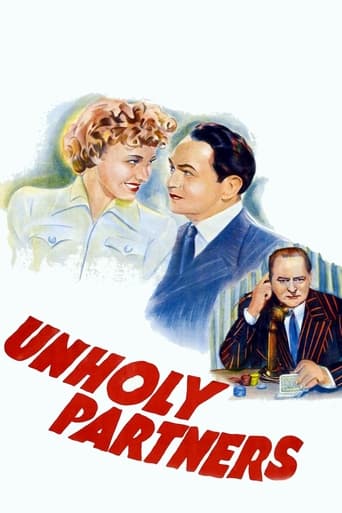clanciai
One of those neglected masterpieces on a minor scale that were outshadowed by more garish and spectacular sensations, like "Citizen Kane" of the same year, that made its hit by targeting Randolph Hearst, which ruined Orson Welles' career to some irrepairable extent, but this film is equally brilliant if not even more, or at least it is even better written, although lacking the flamboyant Welles technique, while Mervyn LeRoy's direction efficiency actually is on more top speed all the way. Robinson's newspaper man is equally controversial and ruthless as Welles but stays on a human basis, which citizen Kane does not. The film is also very reminiscent, and perhaps even more so, of Ben Hecht's and Charles MacArthur's famous "Front Page" of 1931, remade as "His Girl Friday" 1939, which also remains human all the way. They are parallel cases of super brilliant journalism, while "Unholy Partners" is more to the thiller side - shots are actually fired, there are crooks involved, and not until the end you stay uncertain whether Robinson's ruthless editor is on the crooked or the right side. There are many ingenious turnings in this fantastic web of journalistic intrigue, and it would be a pleasure to see it again. I never wanted to see "Citizen Kane" again.
utgard14
Edward G. Robinson plays a newspaperman who comes home from World War I with a plan to launch a tabloid newspaper. The problem is he can't find financial backing from any reputable businessmen, so he gets it from racketeer Edward Arnold. Which is fine, at first, until Robinson starts running stories that tick Arnold off.Enjoyable crime drama from MGM with solid turns from the two Edwards playing characters that aren't so nice. Kind of funny that the protagonist in this is less likable than the villain!. They always tried to give Eddie G. young love interests and in this one it's Laraine Day, who wasn't even born when WWI ended. She's fine but miscast as one could never see her being into Robinson and, frankly, she's at least a decade younger than she should have been. Really I'm not sure why it was necessary to set the film in the post-WWI years, especially when they don't try very hard to capture that era. Many of the hairstyles and clothing are of the 1940s not 1920s. The movie also features a banal "young lovers" subplot. William T. Orr plays the guy and he is nothing special. Lovely Marsha Hunt plays the girl and she gets to sing, which is nice, but other than that also nothing special. Despite some issues, there's no way a movie starring Edward G. Robinson and Edward Arnold could be a total misfire. The movie is most interesting when these two are on screen together. Give it a look for the Eddies.
blanche-2
I was interested in this film for two reasons - I like Edward G. Robinson very much, and just last year, I saw Marsha Hunt at Paramount's 100th anniversary party, 95 years old, with all her marbles, looking marvelous. It is wonderful to see her here, at the age of 23.Unholy Partners takes place after World War I, when a newspaper man, Bruce Corey (Robinson) returns from the conflict - but not to his old reporting job. He wants to start a different kind of newspaper -- more of a tabloid, something people can fold over and read easily in the subway. But he doesn't have the money. He approaches a crooked gambler, Merritt Lambert (Edward Arnold) and wins the $250,000 from him that he needs, making them partners. Corey starts the paper along with his secretary (Laraine Day) and an assistant, Tommy (William T. Orr). Conflicts arise when Lambert objects to the investigation of certain stories that involve him.This is a good film, somewhat melodramatic, with a pretty Hunt singing "After You've Gone" - she had a wonderful voice - as she plays Gail Fenton, who is dating Lambert, but has drawn the interest of Corey's assistant (Orr). If you baby boomers will think back, you may remember that at the end of every TV series produced by Warner Brothers there was the name Wm. T. Orr - Orr became a very successful executive producer. Robinson, Arnold, Day, and Orr are all very good.This film came out around the same time as Citizen Kane so probably got lost in the shuffle, not that it's anywhere near as good. The interesting thing is they talk about the end of tabloid era. Little did they know that we're still in it, worse than ever.The paper Corey starts, The New York Mercury, was based on the newspaper The New York Mirror. One of the reviews mentions reading the Sunday funnies. I did too. It was a fun paper.
boblipton
Potentially interesting story of go-ahead newspaperman Robinson and gangster Arnold as co-owners of groundbreaking tabloid newspaper, wrecked by reducing almost everything to melodrama. Despite the shadowy George Barnes cinematography and great performances by leads and supporting cast, the glossy MGM house style takes the sort of ripped-from-headlines story that director Leroy used to do at Warner Brothers -- often starring Robinson -- and reduces it to mush.


